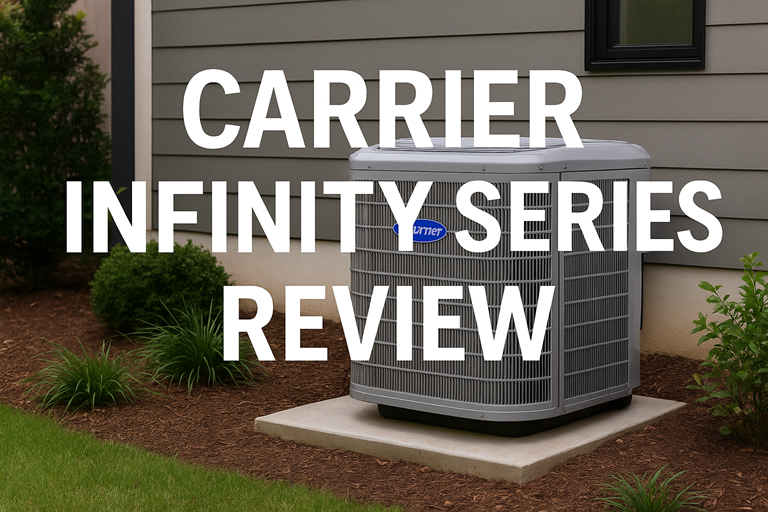

Author:
Revised:
July 25th, 2025
Are you wondering if the Carrier Infinity Series is worth the investment?
Do you know what really makes premium HVAC systems perform as advertised?
By the end of this article, you'll have a clear understanding of what makes the Carrier Infinity Series stand out, who it's best suited for, and what you absolutely need to know before moving forward. We'll break down the key features, pros and cons, comparisons to competitors, and why proper commissioning is the difference between disappointment and real comfort.
What Is the Carrier Infinity Series?
The Carrier Infinity Series represents Carrier's top-of-the-line residential HVAC equipment. This includes:
-
Infinity air conditioners
-
Infinity heat pumps
-
Infinity gas furnaces
-
Infinity communicating thermostats
Each component is engineered to work together as a fully integrated system, providing efficient, smart, and highly consistent comfort throughout your home.
Standout Features of the Carrier Infinity Series
1. Variable-Speed Technology
Unlike basic systems that operate in full-on or full-off modes, most Infinity systems use variable-speed compressors and blowers. This allows:
-
More even temperatures across rooms
-
Improved energy efficiency
-
Exceptionally quiet operation
2. Greenspeed® Intelligence
On select models, Greenspeed® Intelligence adjusts system output in real-time based on both outdoor and indoor conditions. This fine-tuned modulation enhances comfort and optimizes efficiency even during extreme weather swings.
3. Communicating Controls
The Infinity Touch Control thermostat is the brain of the system. It allows:
-
Self-diagnosis of performance issues
-
Automatic adjustments based on weather, usage, and system feedback
-
Remote control via your smartphone
Real-World Example From Central Ohio
A few years ago, one of our Central Ohio customers moved into what they called their "forever home." They wanted year-round comfort, low energy bills, and a system that wouldn't keep them up at night with noise. We installed a complete Carrier Infinity system.
But here's the key: commissioning made the difference.
We measured static pressure, balanced airflow, fine-tuned the refrigerant charge, and programmed their thermostat to match their daily patterns. Weeks later, they called us back to say: "This is the first time our house feels perfectly comfortable everywhere."
This level of comfort doesn't come from the equipment alone. It comes from precision setup. And most contractors skip this step.
Why Commissioning Matters More Than Equipment Brand
Even the best equipment will underperform if it's not installed and commissioned correctly. Commissioning involves:
-
Measuring and adjusting static pressure
-
Setting airflow to manufacturer specs
-
Fine-tuning refrigerant charge
-
Customizing thermostat programming
If your installer isn't discussing commissioning during your initial consultation, that's a serious warning sign.
The Upsides of the Carrier Infinity Series
-
Top-Level Efficiency: SEER2 ratings up to 24; AFUE up to 98%
-
Quiet Operation: Barely audible indoors and out
-
Consistent Comfort: Eliminates hot and cold spots
-
Advanced Automation: Learns your habits, optimizes automatically
The Downsides of the Carrier Infinity Series
-
High Initial Cost: One of the most expensive systems on the residential market
-
Requires Specialized Installers: Only Carrier-authorized dealers can fully unlock its capabilities
-
Limited Mixing and Matching: Works best as a complete Infinity package
-
Overkill for Some Homes: May not be necessary for smaller or rarely-used homes
Who Should Consider the Carrier Infinity Series?
Ideal For:
-
Homeowners who value consistent comfort and quiet operation
-
Larger, multi-level homes
-
Those planning to stay long-term
-
Tech-forward buyers who want full system automation and remote access
Not Ideal For:
-
Budget-sensitive homeowners
-
Condos or smaller homes
-
Homes with unresolved ductwork or insulation issues
Carrier Infinity vs. Trane XV20i vs. Lennox Signature
-
Performance: Comparable across all three premium brands
-
Integration: Carrier leads in system-wide smart integration
-
Durability: Trane is known for its coil and cabinet strength
-
Price: Lennox may offer similar SEER ratings at slightly lower cost
Is the Carrier Infinity Series Worth It?
If your goal is maximum comfort, energy savings, and cutting-edge control, the Carrier Infinity Series delivers. But it’s not a universal fit for every home or every budget.
At Fire & Ice, we only recommend systems like the Carrier Infinity after assessing your home’s design, your comfort goals, and your long-term plans. And no matter what system you choose, expert commissioning is what ultimately delivers the comfort you're paying for.
Your Next Step
If you're considering a Carrier Infinity system, schedule your free exact quote with one of our comfort guides. We'll visit your home, perform a full assessment, and give you a precise, no-surprises price for the best-fit options.


